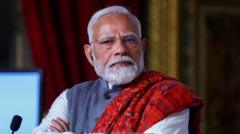In the upcoming high-stakes meeting between Indian Prime Minister Narendra Modi and President Donald Trump in Washington, the world will witness a blend of personal rapport and pressing diplomatic negotiations. Modi's long-standing relationship with Trump—bolstered by joint public appearances and strategic alignment against common adversaries such as China—sets the stage for a multifaceted agenda, including trade, tariffs, and energy policies.
Although their meetings have often been punctuated with camaraderie and positive rhetoric, the transactional nature of their discussions cannot be overlooked. Both leaders are expected to arrive equipped with a set of demands that underscore the complexity of US-India relations. India's Foreign Minister, S. Jaishankar, has indicated that Delhi is keen on addressing Trump's calls for lower tariffs while simultaneously discussing potential economic partnership accords aimed at mitigating trade imbalances—essentially rebalancing a deficit that has hovered around $46 billion.
Furthermore, Modi's administration has signaled its willingness to tackle issues surrounding undocumented Indian immigrants in the U.S., a topic that raises concerns given the estimated 700,000 Indian nationals in potential peril of deportation. In light of recent discussions regarding the treatment of deported individuals, it is clear that this will be a sensitive issue on Modi's agenda.
Energy cooperation is another critical component of the discussions. While Trump is likely to push for increased Indian purchases of American oil, Modi may advocate for greater American investment in India's burgeoning nuclear energy sector as part of its ambitious renewable energy goals. This presents an interesting juxtaposition, as India grapples with the reality of rising oil prices in a post-invasion Ukraine world, thus exploring all avenues for energy independence.
Additionally, technology is set to be a linchpin of their discussions, particularly regarding the H-1B visa program which plays a crucial role in bringing skilled Indian professionals to the U.S. This topic could see Modi seeking assurances from Trump in relation to maintaining the current regulatory landscape.
Modi's visit will also address wider geopolitical dynamics, including cooperation in regional conflict areas such as the ongoing wars in Ukraine and Gaza. With India's ties to both Russia and Israel, Modi may find himself in a unique position to facilitate dialogue, a role that Trump might be willing to explore.
As the leaders prepare to engage on these intricate issues, the broader implications of their negotiations could reverberate across various sectors—from technology and energy to international diplomacy. The anticipated focus on the Indo-Pacific Quad alliance further signifies the strategic importance of enhancing bilateral cooperation, especially in countering Beijing's influence.
While some discussions may lead to contentious negotiations, both Modi and Trump will be keen to maintain a positive diplomatic climate. As the meeting approaches, the world watches closely to see how these two leaders navigate the intricacies of their powerful partnership amid external pressures and challenges.


















